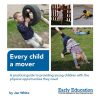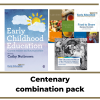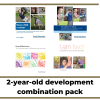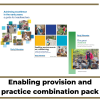Chapter 1: The centrality of play in early childhood
Back to overview of chapter resources Chapter authors Nancy Stewart Kierna Corr Julia Henderson Chapter overview Play is a fundamental in childhood, and enshrined as
In this chapter, we explore and analyse developments in the Early Childhood Education and Care (ECEC) curriculum, tracing philosophical concepts and policy influences, to identify what has shaped current understandings of an ECEC curriculum. This journey of evolving ECEC examines the influence of early years pioneers, such as Fredrich Froebel (1826), Maria Montessori (1912), Margaret McMillan (1919), Rachael McMillan and Susan Isaacs (1929), identifying how the roles of adults, children and environments within ECEC have developed over time to promote high-quality pedagogy. We critically consider the interplay of policy initiatives in the evolution of the ECEC curriculum in England, highlighting where policy has both drawn on and contradicted the philosophical origins of ECEC. International research illustrates different philosophical conceptions of child-centredness within ECEC and how children can be made “present” and actively central within early learning (Campbell-Barr and Georgeson, 2021). We conclude with insights and recommendations for a future early years curriculum centred around the child.
Giardiello, P. (2014) Pioneers in Early Childhood Education. London: Routledge.
This book traces influences of ECEC from Rousseau to present day.
Nutbrown, C. and Clough, P. (2014) Early Childhood Education: History, Philosophy and Experience (2/e) London: Sage.
This book on the work of ECE pioneers, includes fictional conversations with many of them, to highlight their contributions.
Wood, E. (2020) Learning, development, and the early childhood curriculum: a critical discourse analysis of the early years foundation stage, Journal of Early Childhood Research, 18(3), 321–336.
This article questions the selective use of child development theories as the underpinning knowledge base for practice EYFS.
The Child-Centred Competence for Early Childhood Education and Care was an Erasmus+ project that looked to explore the meaning of child-centredness and what it looks like in practice. At the below website you can find a range of resources to support you explorations of child-centredness and understand more about the origins of the term.
Child-Centred Competences for Early Childhood Education and Care (Early Education)

Back to overview of chapter resources Chapter authors Nancy Stewart Kierna Corr Julia Henderson Chapter overview Play is a fundamental in childhood, and enshrined as
Back to overview of chapter resources Chapter authors Sue Allingham Nicola Brinning Chapter overview This chapter is built around the policy contexts of Wales and
Back to overview of chapter resources Chapter authors Alison Featherbe Louise Lloyd-Evans Helen Moylett Chapter overview In the early years, where our habits of mind
Back to overview of chapter resources Chapter authors Elizabeth Henderson Emma Gordon Helen McKinnon Jacqueline Bremner Maggie MacDonald Chapter overview Taking a Scottish perspective, this
Back to overview of chapter resources Chapter authors Cathy Nutbrown Becky Cook Chapter overview Early childhood education settings are increasingly, developing work with parents to
Back to overview of chapter resources Chapter authors Aline-Wendy Dunlop Lisa Barnes Myra McRobbie Chapter overview In this chapter we have chosen a transitions lens
Back to overview of chapter resources Chapter authors Jan Georgeson Emma Short Helen Adams Kate Ullman Chapter overview This chapter traces a brief history of
Back to overview of chapter resources Chapter authors Stella Louis Sally Cave Nasma Meah Chapter overview This chapter outlines what anti-discriminatory practice is and the
Back to overview of chapter resources Chapter authors Shaddai Tembo Fifi Benham Chapter overview This chapter examines the role of gender and LGBTQ+ inclusive practice
Back to overview of chapter resources Chapter authors Kathy Sylva Lesley Curtis Chapter overview This chapter explores the role of Children’s Centres (CCs) in serving
Back to overview of chapter resources Chapter authors Nathan Archer David Yates Chapter overview When considering the future, looking back at recent changes in the
Back to overview of chapter resources Chapter authors Elizabeth Wood Louise Kay Jessica Travers Chapter overview This chapter draws on international research to indicate how
Back to overview of chapter resources Chapter authors Cathy Nutbrown Beatrice Merrick Chapter overview This chapter is a little different from the others. It considers









Early Education
2 Victoria Square
St Albans
AL1 3TF
T: 01727 884925
E: office@early-education.org.uk